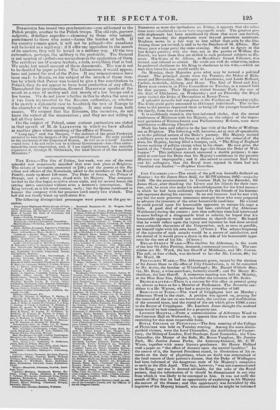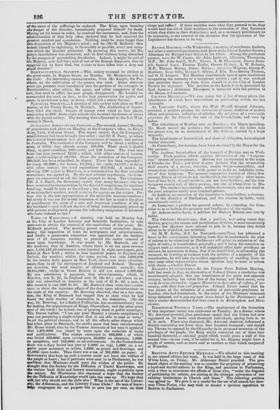CITY Cirssumns„six.—The result of the poll was formally declared on
Monday for Sir James Shaw 3447, for 1110Waithinan 2007—majority 1440. On the announcement in Common Hall, by the Recorder, Sir James Shaw, after thanking the Livery and his friends for their eXer- tion, said, he must also make his acknowledgments for the kind manner in which he had been uniformly received by the friends of his honour- able opponent during his canvass. In no one instance had he met with. ally but the most generous treatment amongst those who were prepared to advance the interests of the other honourable candidate. He wished
he could prevail upon his honourable opponent to retrace his steps a little. A good deal of acrimony had been exhibited (by Alderman Waithman) during the contest : now that sufficient time had intervened to cause feelings of a disagreeable kind to subside, he hoped that his honourable opponent would not continue to cherish them. He hoped that he would reflect upon the injury and injustice he had done several most estimable characters of the Corporation, and, as soon as possible, set himself right with his own heart. (Cheers.) The acknowledgment of the injustice of such attacks would be a source of satisfaction, and the denial of it would prove a thorn in the side of his honourable oppo- nent for the rest of his life. (Cheers.) •
BROAD STREET WARD.—The election for Alderman, in the room of the late Sir John Perring, deceased, commenced yesterday. The-can- didates are Mr. Ward, the late Sheriff of Middlesex, and Mr. Cowan. The poll, at four o'clock, was declared to be—for Mr. Cowan, AO; for Mr. Ward, 30.
PORT SOKEN WARD.—The Aldermanic gown, vacant by the election of Sir James Shaw to the office of City Chamberlain, is to be contested by Mr. Scales, the butcher at Whitechapel ; Mr. Daniel Whittle Har- vey, Mr. Reay, a wine-merchant, formerly sheriff; and Sir Henry Ri- chardson the late Sheriff. A numerous meeting was held on Monday, at the Blue Boar Inn, Aldgate, to further the interests of Mr. Scales.
BatunEssasTER.—There is a canvass for this office at present going on, almost as keen as for a Member of Parliament. The favourite can- didate is a Mr. Watson, who had a majority yesterday of 543 REDUCTION OF TAXES.—The ward of Cripplegate met on Monday ; Alderman Wood in the chair. A petition was agreed on, praying for the removal of the tax on sea-borne coals, the revision and modification of the assessed taxes, and the repeal of the act which gives 10004 a year to the Rector of Cripplegate. Mr. Lambert Jones thought the assessed taxes would be best commuted for a property-tax.
LONDON MILITIA.—From a communication of Alderman Wood to the Common Hall on Wednesday, it appears that there will be no more recruiting for this most respectable force.
ROYAL COLLEGE OF PILYSICIANS.—The first meeting of the College of Physicians was held on Tuesday evening. Among the more distin- guished visiters, were the Lord Chancellor, the Archbishop of Canter.. bury, the Bishop of London, Earl Stanhope, Lord Tenterden, the Vice. Chancellor, the Master of the Rolls, Mr. Baron Vaughan, Mr. Justice Park, Mr. Justice James Parke, the Attorney-General, Mr. C. W. Wynn, together with many- literary gentlemen. Sir Henry Hafford read a paper on "the effect of diseases upon the mental faculties." In the course of it,. the learned President stated, in illustration of his re- marks on the duty of physicians where no doubt was entertained of the fatal nature of their patient's disease, that the Duke of 'Wellington had been informed of the dangerous state of his Majesty's complaint as early as the 27th April. The fact, however, "was not communicated to the King; nor was it deemed advisable, for the sake of the Royal patient, that the information of it should be disseminated in any way from which it was likely to be conveyed to him. It was not unfit the month of May that he had an opportunity of explaining to his Majesty the nature of the disease; and this opportunity was furnished by the inquiries of his Majesty himself, who desired that lie might be informed
of the cause of the sufferings he endured. The King, upon learning tbe danger of the disorder, immediately prepared himself for death. Having set his house in order, he received the sacrament, and, from the administration of that holy office, declared that he had received the greatest comfort and censolation. Nothing could be more happy than this disposition of his Majesty's mind ; and he (Sir H. Halford) then betook himself to explaining, as favourably as possible, every new symp- tom which the disorder presented. By pursuing this course, his Ma- jesty's cheerfulness was preserved, and he died without being disturbed by the prospect of approaching dissolution. Indeed, it might be said of Liz Majesty, as it had been said of one of the Roman Emperors, that he aptseared not to have died, but rather to have fallen into a deep and platatl slumber."
TIORT/CULTURAL Soctrrv.—This society resumed its sittings at the great room, in Regent Street, on Monday. Dr. Henderson was in the chair. An interesting communication, from Mr. Knight, the Pre- sident, on the cultivation of the potato, was read. About sixty-six yews ago, potatoes were introduced into the gardens of the cottagers in Herefordshire; after which, the agues, and other complaints of that sort, that used to afflict the poor people, disappeared. Mr. Lindley re- commended dry sand, or fern, as the best preservative for apples and pears, in preference to hay or straw, which left a musty flavour. Newroefee SOCIETY.—A. meeting of this society took place on Wed. aesday, at the Vestry Room, St. Martin's. The Archbishop of Canter- bury filled the chair. Grants of money were voted to four places, amounting to 2901. Sixty-eight schools also received the favour of union with the parent society. The meeting then adjourned to the first Wed- omday in March.
AUSTRALIAN AGRICULTURAL COMPANY.—The seventh Annual Meeting of proprietors took place on Monday, at the Company's office' in King's Arnis Yard, Coleman Street. The report stated, that the Company's establishment had been brought into order ; and Sir E. Parry, to whom the Colonial Government had given assurances of support, had arrived in Australia. The territories of the Company will be about a million of acres, of which they already occupy 400,000. Their stock is 25,000 sheep, in good condition, 2000 cattle, and 250 horses. The wool sent home last year produced 72551.; which, with other sources of income, made a total receipt of 10,0001. Since the formation of the Company, 200,8841. has been subscribed, in shares. There has been expended— for sheep, 68,2001.; for horses' 10,7554; for cattle, 14,5331.; making, with other outlays, the total expenditure 207,958/. A motion for allowing 300/. a year to Directors, as a remuneration for their punctual attendance, was agreed to. By the new colonial regulations, the Com- pany are empowered to sell the land granted to them. The Chairman (Ir. J. A. Smith, the Governor) stated, that many labourers who had been sentenced to transportation by the Special Commissions, for machine. breaking, would be sent to the colony ; but that the Directors, instead assenting their services, would write to the agents on the subject. Per- haps this is the best appropriation of the miserable machine-breakers ; but surely it was not the tender intention of the law to render the place of punishment the scene of a new and improved condition of life to the banished !—and will not the fear of being indiscriminately mixed up with persons so disgraced, prevent the voluntary emigration of labourers who have violated no law !
Ts ON KNOWLEDGE,--A meeting was held on Monday last, at the City of London Literary and ''Scientific Institution, to take measures to obtain the removal of the restrictions of the press. Dr. Eirkiteck presided. The meeting passed several resolutions depre- catieg the imposition of taxes on newspapers and advertisements, and finally a permanent committee was appointed for the further- ance of all measures tending to procure the entire removal of team upon knowledge. It was stated by Mr. Roebuck, one of the speakers, that in America, where there is no tax upon newspa- pers, 1,456,416 advertisements were inserted in eight newspapers' pub- lished at New York ; whilst in four hundred papers in England and Ireland, the number, within the same period, was only 1,000,000. In the twelve daily papers at New York, there were more advertise- ments than in all the newspapers of England and Ireland. Through- out America, the total number of advertisements, annually, was 10,10.5,000 ; whilst in Great Britain if did not exceed 1,000,000. Ey one calculation it appeared, that advertisements, which, in America, cost 7s. 7d., in England cost 3/. I8s. Od. ; and where an ar. tide was advertised in America at the rate of Cl. 8s. Od. a year, in this country it cost 2001. Gs. (hi. Mr. Roebuck then went into a state-. meat to show the injurious effects of the duty upon advertisements to the wade of the country. Dr. Bowring observed, that on a late occa- sion, the King of Denmark had begged him to state what he had found the most worthy of observation in his dominions. (By the way, Dr. Bowring, for a Radical-Utilitarian, has an extraordinary turn for making the acquaintance of Kings, Chancellors, and the other great ones of the earth : he is fond, too, of quoting them at public meetings.) The Doctor replied, "I can pay your Majesty a sincere compliment in your not possessing a single subject that is not able to read or write." In all the political changes, and in all the efforts Kifter change which bad taken place in Denmark, the public peace had been uninterrupted. 31r. Hume stated, that by the-Finance Accounts of last year it appeared that 1,400,000. was raised by taxes upon the materials of books and publications. The stamps amounted to 666,0001.; of which was levied 480,000/. upon newspapers, 30,000/. on almanacs, 1,000/. on pamphlets, and 153,000/. on advertisements. At the Customhouse there was a duty levied last year of 2,200/. on rags, 1,4001 on a su- petior paper necessary to artists, 1,600/. on prints and drawings, and 11,0004 upon books. Then there was a tax of 701,0001. on paper. A Government that kept up such a system could not have the welfare of the people at heart ; but if petitions were sent in to Parliament, he was eemEdent that Ministers would meet the wishes of the public. He thought that the Society for the Diffusion of Useful Knowledge, and the various book clubs and literary associations, ought to petition upon the subject. Mr. Warburton also expressed a hope that the Society for the Diffusion of Knowledge would take the case up. We hope they will, but why should not the clubs also ? What is the use of the Univer- sity, the Athenwum, and the Literary Union Clubs ? Do men of know- ledge congregate for no purpose but to save ten per cent, on their chops-and coffee ? If these societies were what they pretend to be, they would lend the aid of their numbers to the extension of that literature which they claim as their distinction ; and, as a necessary preliminary to its extension, to the removal of the obstacles that the ignorance of the Legislature has thrown in its way.



























 Previous page
Previous page